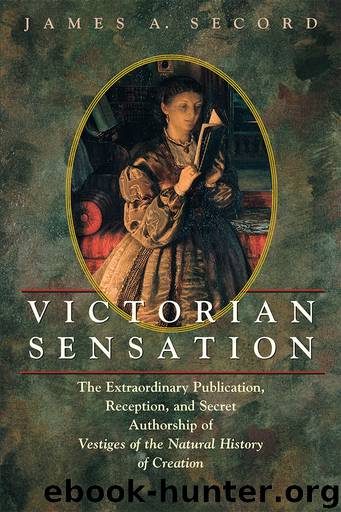Victorian Sensation by James A. Secord

Author:James A. Secord [Secord, James A.]
Language: eng
Format: epub
Publisher: University of Chicago Press
Published: 2000-01-01T05:00:00+00:00
11.4 The phrenological organ of Secretiveness, marked here with a “7.” Combe 1843, 1:295.
Chambers shared the view, common among the early Victorian bourgeoisie, of the need to maintain the appearance of absolute integrity. The ideal derived from traditional codes in which the gentleman embodied truth in his person. Contemporary moralists argued, against Scott, that the secrets of authorship were no exception to the rule that one must not lie. Whewell, in his Elements of Morality (1845), took a particularly strong view on this: authors might “baffle curiosity” by evasion or turning the question, but allowing any impression contrary to the truth to develop was bad faith and would leave a “moral stain.” The use of language implied certain mutual understandings that should never be violated.22 Chambers, who by this standard was a moral reprobate, was simply concerned to avoid a direct lie in circumstances where it might be openly contradicted. He could insinuate, equivocate, mislead, tell half-truths; but a public falsehood would have destroyed his character as a man of honor. This, then, was the one role that underpinned all the other parts played by Chambers.
Anonymity in print gave an aura of mysterious power, but in letters and conversations it was a source of fun. Throughout the coming years, Chambers effectively acted the part of an ordinary reader engaged in the game of detecting the author. His secret correspondence is punctuated by miniature dramas, complete with dialogue, that illustrated how he played his role. One remarkable trial in the week of publication had Chambers speaking his anonymous text to close friends to gauge the reaction: he took a copy to Catherine Crowe and read her “the main chapter”—presumably the pivotal discussion of organic development—without admitting that he was the author. Chambers was delighted with her response, but was even more pleased by Combe’s praise for this “great new dig into the sides of superstition” and his plan to write to the Vestiges author through the publisher. “You cannot imagine how amusing all this was to Ignotus,” Chambers confided to Ireland, also asking for any news about the effect of Vestiges on “highly endowed minds.”23
Chambers waited eagerly for word from London. After a few weeks without much news, the scale of the sensation became clear, and it looked as though the veil of anonymity might be withdrawn. A friend from London mentioned that scientific men were full of praise: “‘A wonderful work’ is the remark of all, while most agree with the author’s hypothesis.” As Chambers told Ireland in mid-November:
Your two last communications have given immense pleasure to the author of the opus. Having kept his hopes down at the lowest mark—like a prudent cool Scotchman as he is—he unavoidably feels much elevated by tokens of success so unequivocal, and which have in a manner burst upon him. He capers in thought at the idea of Lockhart’s note, considering how that serpent would speak of him at this moment as the author of all he has written besides the opus. This
Download
This site does not store any files on its server. We only index and link to content provided by other sites. Please contact the content providers to delete copyright contents if any and email us, we'll remove relevant links or contents immediately.
The Lonely City by Olivia Laing(4113)
Animal Frequency by Melissa Alvarez(3750)
All Creatures Great and Small by James Herriot(3510)
Walking by Henry David Thoreau(3228)
Exit West by Mohsin Hamid(3175)
Origin Story: A Big History of Everything by David Christian(3133)
COSMOS by Carl Sagan(2944)
How to Read Water: Clues and Patterns from Puddles to the Sea (Natural Navigation) by Tristan Gooley(2849)
Hedgerow by John Wright(2772)
The Inner Life of Animals by Peter Wohlleben(2763)
Origin Story by David Christian(2677)
How to Read Nature by Tristan Gooley(2657)
Project Animal Farm: An Accidental Journey into the Secret World of Farming and the Truth About Our Food by Sonia Faruqi(2656)
How to Do Nothing by Jenny Odell(2640)
A Forest Journey by John Perlin(2584)
Water by Ian Miller(2579)
The Plant Messiah by Carlos Magdalena(2451)
A Wilder Time by William E. Glassley(2358)
Forests: A Very Short Introduction by Jaboury Ghazoul(2332)
